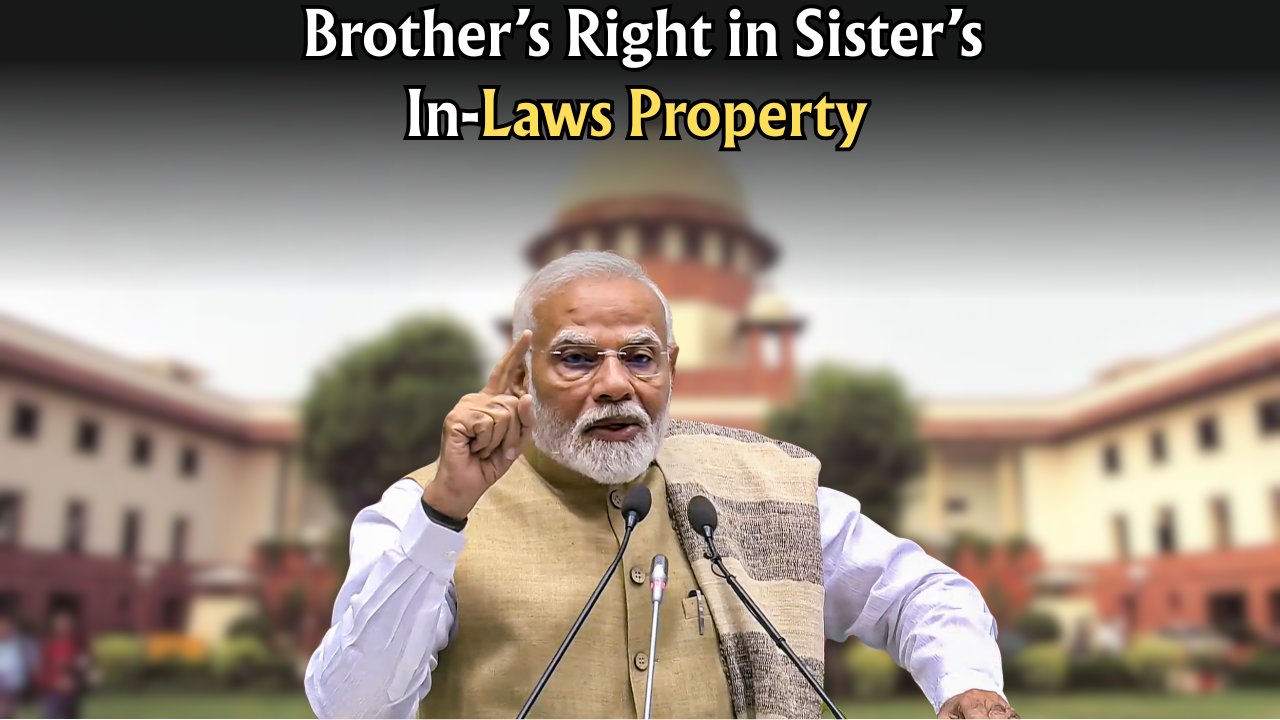Property News : The Supreme Court of India has recently delivered a significant ruling that clarifies the legal boundaries regarding a brother’s claim over his sister’s in-laws’ property. This decision has created widespread public interest and stirred emotional reactions due to the sensitive family dynamics and inheritance expectations involved.
This article will help you understand what the Supreme Court has ruled, who it impacts, and why it matters in both legal and emotional terms. Read on to get a complete breakdown of this crucial case.
Property News background of the Case: Why Was This Issue Raised?
Inheritance laws in India have long been a source of confusion, especially when it comes to the extended family. This case arose when a man attempted to claim a share in the property owned by his sister’s in-laws, citing familial ties.
However, the core legal question was: Does a brother have any legal right over the property owned by his sister’s husband’s family? The Supreme Court’s judgment has now settled this matter with absolute clarity.
Key Points from the Background
- The brother believed he had rights to his sister’s in-laws’ property due to past contributions.
- The sister had been married for many years and was part of her in-laws’ household.
- The legal battle stretched over several years before reaching the Supreme Court.
- The in-laws contested the claim, asserting there were no legal grounds for such a demand.
Supreme Court’s Landmark Judgment: What Was Decided?
The Supreme Court categorically ruled that a brother has no legal claim over the property of his sister’s in-laws. The court emphasized the importance of legal ownership, family structure, and personal rights over emotional arguments.
Highlights of the Verdict
- The property of the sister’s in-laws is considered self-acquired or ancestral within that family unit.
- A brother of the wife has no blood relation or legal linkage to the in-laws’ property.
- The judgment was passed by a bench of two senior judges, who called the claim “legally unsustainable”.
- The verdict stressed the importance of avoiding misuse of familial relationships for property disputes.
see More : 5G Internet & Unlimited Calling at a Crazy Price
Statements from the Court
“Property belonging to a woman’s in-laws cannot be claimed by her brother merely on the grounds of relationship. There must be a direct legal link or inheritance clause in place.”
“We must prevent a misuse of emotional connections to manipulate property laws.”
Legal Foundation: Why the Brother’s Claim Was Rejected
Indian property laws draw a clear line between blood relations and marital relations. The court referred to various existing legal provisions that define property rights:
Legal Provisions Considered
| Law/Act | Key Provisions | Application in Case |
|---|---|---|
| Hindu Succession Act, 1956 | Property devolves to legal heirs (children, spouse, parents) | Brother not considered a legal heir of in-laws |
| Indian Succession Act, 1925 | Defines who can inherit property based on relationship | Brother has no inheritance rights in sister’s marital home |
| Transfer of Property Act, 1882 | Only legal owners can transfer property | Emotional ties don’t validate ownership |
| Evidence Act, 1872 | Burden of proof lies on the claimant | Brother failed to prove legal right or contribution |
| Family Law Principles | Family members have rights within their respective families | No crossover into marital families |
| Supreme Court Precedents | Previous rulings restrict third-party claims | Reinforces no right for brothers-in-law |
| Property Rights of Women | Protects women’s in-laws’ property from third-party claims | Applies directly to prevent misuse |
Common Misconceptions About Property Rights
A number of social myths fuel property disputes like this. Many believe that if a brother helps during marriage or provides financial aid, he becomes entitled to property in the in-laws’ house. The court strictly denied these ideas.
Misbeliefs vs Reality
| Common Misbelief | Legal Reality |
|---|---|
| “I supported my sister’s wedding, so I deserve a share.” | Support during marriage doesn’t create legal ownership |
| “She is my sister; her in-laws’ house is like my own.” | No legal relation exists between brother and in-laws |
| “I lived there for some time, so I have rights.” | Temporary stay doesn’t give ownership rights |
| “She wants to give me a share.” | Only legal owners can transfer property legally |
| “My sister’s husband promised me property.” | Oral promises are not binding without documentation |
| “I invested in renovation, so I get a share.” | Unless proven by agreement, no ownership claim arises |
| “Family bond means equal property rights.” | Law defines ownership based on legal, not emotional ties |
Emotional vs Legal Entitlement: Where the Conflict Lies
This case is a prime example of emotional entitlement conflicting with legal rights. While emotions and relationships are deeply valued in Indian families, legal ownership must be determined by laws, not bonds.
Emotional Expectations
- Brothers often feel emotionally invested in their sister’s married life.
- Sisters may want to support their brothers with family property.
- Parents sometimes push for equal support among children, including through in-law families.
Legal Boundaries
- The court firmly upheld that no emotional obligation can override the law.
- Only the rightful owners, such as the husband, children, or legal heirs of the in-laws, can inherit or transfer property.
- The law prevents unfair and unauthorised claims to protect families from exploitation.
What This Verdict Means for Families and Future Disputes
This judgment sets a strong precedent and sends a clear message for all similar future cases. It brings clarity to families and encourages fair handling of inheritance.
Implications of the Verdict
| Stakeholder | Impact |
|---|---|
| Brothers | Cannot make claims on sister’s in-laws’ property |
| Sisters | Protected from pressure by siblings to share in-laws’ assets |
| In-laws | Strengthened legal rights to defend property ownership |
| Legal System | Reduced misuse of property disputes rooted in emotions |
| Family Units | Encouragement for clear documentation and legal planning |
| Lawyers | Better clarity on representing such disputes |
| Society | Promotes legal literacy and reduces false claims |
Practical Advice: How to Handle Property Disputes Within Families
While such legal decisions are vital, it’s also important to know how to prevent conflicts through proper planning and communication.
Preventive Measures
- Always document property ownership and intentions legally.
- Avoid verbal promises regarding property.
- Conduct family discussions with legal advice present.
- Ensure women’s property rights are protected by legal documentation.
- Avoid involving unrelated family members in property deals.
- Be aware of the exact legal definition of “heir” and “ownership”.
What You Should Take Away
The Supreme Court’s ruling makes it abundantly clear that no brother can claim rights over his sister’s in-laws’ property without direct legal inheritance or ownership proof. This is a crucial judgment for millions of families navigating complex property relations in India.
This article is meant for general informational purposes. For specific legal advice, you must consult a qualified legal professional or advocate. Every case may vary based on facts, documentation, and jurisdiction.
Understanding your rights — and limits — is key to maintaining peace and legality within family property matters.







